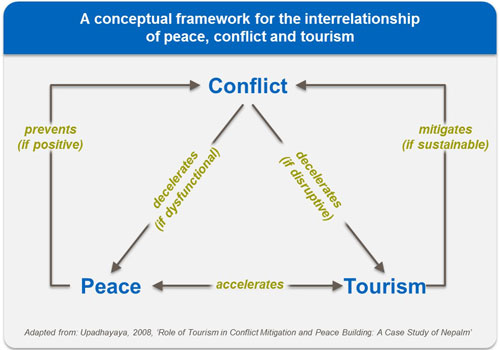Myanmar-Tourism: a double-edged sword for peace & conflict, “Do No Harm” urged
Poorly managed large-scale or intensive tourism development can negatively affect communities, such as land confiscation, environmental destruction and exploitative jobs, the newly published Do No Harm toolkit for Myanmar’s tourism sector stated.
The publication was published by UK aid-funded Business Innovation Facility (BIF) in Myanmar, in collaboration with non-profit organisation CDA Collaborative Learning Projects, to analyse the links between conflict, peace and tourism activities. It provides practical templates to assist tour operators and businesses approach their activities in a way which promotes peace and limits the risk of causing harm to local communities.
The BIF is a five-year initiative funded by the UK Department for International Development (DFID). The initative aims to catalyse the introduction of commercially viable, pro-poor market innovations which will deliver economic growth and reduce poverty.
“The Do No Harm Toolkit for the Tourism Industry was developed for businesses, civil and government organisations that directly or indirectly supply goods or services to the tourism, travel and hospitality industries.
“The toolkit presents a background to conflict, peace and Do No Harm in the context of the tourism industry.
“This is followed by practical analysis templates to help tourism businesses approach their business activities in a manner that promotes positive relationships with, and limits the risks of causing harm to, local people and places,” the press release from the BIF elaborated.
UK-funded project Conflict Sensitivity defines a “Do No Harm” approach as a manner which involves “gaining a sound understanding of the two-way interaction between activities and context and acting to minimise negative impacts and maximise positive impacts of intervention on conflict.”
According to World Bank’s publication in 2015, conflict and violence have created barriers to development for many countries and, if conflicts reoccur, many years of development gains can be lost.
In its most recent Country Partnership Framework for Myanmar (2015-17), the international organisation stressed that “the first priority will be to do no harm.”
“External actors could exacerbate risks by moving too far or too fast in certain areas before these have been sufficiently resolved through the political process.
“Relatedly, there is a risk of moving too quickly towards normalisation of development modalities without considering necessary adaptations for areas affected by subnational conflict,” the document added.
The toolkit sought to explain the interrelationship between tourism, conflict and peace, drawing on the example of Nepal’s tourism performance during and after violent armed conflict.
It argued that tourism is highly vulnerable to periods of disorder and turmoil. War, armed conflict and other forms of civil unrest such as human rights violations can partially or totally, obstruct the positive impacts and economic opportunities that tourism can bring to communities. Even if conflict is geographically limited, the media coverage can pose a threat to an entire country or destination brand, especially in relation with the travellers’ perception of safety and security. This can drastically reduce visitor flows and hence limit development opportunities in the whole country, including peaceful areas.
In contrast, when the message of peace is received in source markets, international tourists are confident about the safety of a destination. This can result in an increased demand and stimulate significant investment in both public and private infrastructure, from roads and resorts to education and training opportunities for the local workforce.
“Tourism in the Developing World: Promoting Peace and Reducing Poverty”, a special report from the United States Institute for Peace on how tourism can promote peace and tackle poverty, emphasised that tourism needs to be complemented by an extensive range of public sector planning, institutions and a sound governing framework.
“While tourism can benefit developing economies, to set up a fully functioning industry, tourism must be supported by a complex range of public sector planning and policy instruments, laws, regulations and standards as well as public and private sector institutions, infrastructure, investment, products and services,” the special report argued.
The notion of “tourism and conflict” is relevant in the context of visitors or tour operators entering new destinations and communities. The toolkit cautioned that large-scale or intensive tourism development, for example, resort or significant airport development, can result in considerable negative impacts if not properly managed. The consequences include:
“Land confiscation, lack of compensation and displacement of local people; destruction of traditional livelihoods and/or cultural heritage [both tangible and intangible];
“Damage to the natural environment [e.g. littering, sand mining, overuse of water resources];
“Exploitative jobs offering little or no job security or social protection for families [e.g. child labour, begging, orphanage tourism, sex tourism];
“Restricted capacity for organised labour;
“Diminished individual or community aspiration for personal or societal integration; and limited opportunities for freedom of expression, access to grievance mechanisms and participatory decision-making.”
The publication added that small-scale operators must also be aware that their impact is never neutral.
“Social impacts, such as where tourists stop to eat, who they buy products from and where they stay overnight can benefit some people in a community more than others.
“When a context is characterised by conflict, the actions of an organisation are likely to have a bigger impact on community dynamics, for better or for worse,” it said.
The BIF stated that this toolkit aims to bring about “a systemic change” in the manner “tourism businesses operate and interact with local communities.”
Source: http://www.mmtimes.com/index.php/business/26346-tourism-a-double-edged-sword-for-peace-conflict-do-no-harm-urged.html


 Thailand
Thailand




